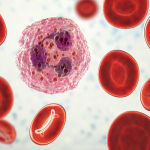- Inflammation is an essential response of the immune system.
- Australian researchers from St Vincent’s Hospital Sydney and Macquarie University have identified a way to block a biochemical pathway which is involved in inflammation of the brain.
- Early preclinical studies show promising results in decreasing disease progression in models of MS.
- This study may help provide a foundation for further clinical trials in MS.
Recent media attention has focused on the work of some preeminent Australian scientists based at the St Vincent’s Hospital Sydney and Macquarie University. This attention follows the publication of their work in the prestigious scientific journal – the Journal of Neuroinflammation.
The research team have identified a way to block a critical biochemical pathway involved in inflammation – the Kynurenine pathway (KP) – and prevent brain inflammation and degeneration.
Inflammation is one of the ways the body fights against things that harm it. This can include infections from viruses and bacteria, but also it is the way the body cleans up areas of injury. When something damages the body or the cells that make up the body, the cells in the damaged area release chemical signals that attract the body’s immune system. This results in the five signs of inflammation: swelling, redness, heat, pain and loss of function. Similar processes happen in the brain and spinal cord of people with MS when the myelin coating on nerve fibres gets damaged, referred to as neuroinflammation.
This group of researchers, Dr Gayathri Sundaram and Dr Edwin Lim, Professor Bruce Brew and Professor Gilles Guillemin have been focusing on a biochemical pathway that occurs in cells of the human body – the KP. A biochemical pathway is the chemical process cells undertake to make different chemicals and carry out various functions. The KP is a chemical process by which cells can create the extensive energy required during an inflammatory response.
In 2017 this team described a way to use the level of activity of the KP in people with MS to predict progression of MS from early-mild stage inflammatory MS to a more advanced stage of MS (read more here). Their new findings identify the underlying biological mechanism. Furthermore, when they used chemical inhibitors of this pathway to block it in laboratory models of MS, they found they could also block progression from earlier inflammatory phases of the disease to the more advanced degenerative forms of the disease. The study provides evidence of the involvement of the KP in disease progression and severity. It suggests blocking the pathway by inhibitors could be a useful approach in the treatment of MS.
Additionally, this mechanism may also have applications for other inflammatory, autoimmune and neurodegenerative diseases. These findings now enable the team to progress to late pre-clinical trials before hopefully managing to get to the clinical trial stage in people. We look forward to seeing the results from the next steps.






